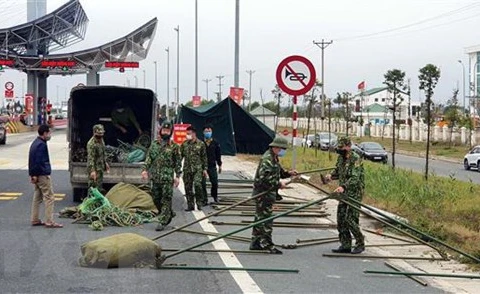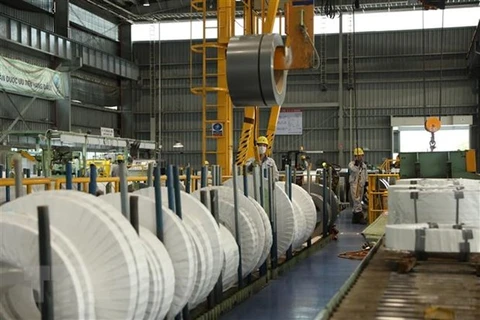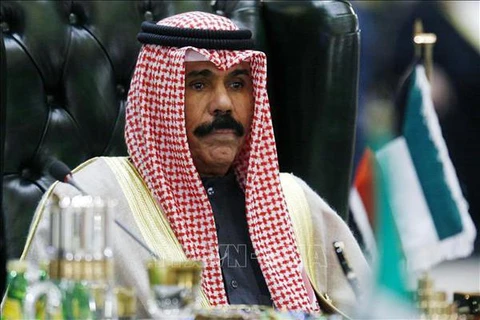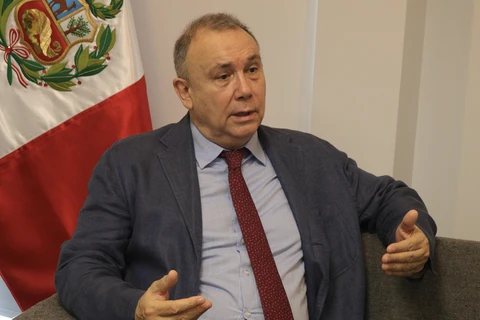Hanoi (VNA) - Prof. Pankaj Jha of O.P. Jindal Global University in Sonepat of India has lauded Vietnam’s economic development in recent years.
In a recent article published at moderndiplomacy.eu, he said that in the year 1986, the “Doi Moi” (Renewal) economic reform programmes were initiated. This paved the way for further reforms in the equity markets and disinvestment of the state-owned enterprises.
In 2021, the projected real GDP percentage growth would be around 6.7 percent while the inflation rate would remain stable at 3.8 percent.
“This is a fulfilling prophecy which clearly outlines that Vietnam has come out of the COVID-19 pandemic and there are signs of domestic recovery as well as consolidation of trade from the trading partners,” the scholar noted.
In fact, one of the achievements of the Communist Party of Vietnam (CPV) has been in reducing the budgetary deficit and outlining new restrictions with regard to government guarantees.
In the last five years, the CPV has taken active interest in reforms in terms of disinvestment of the state-owned large enterprises and also modernising the monetary and fiscal systems. The fight against corruption has paid dividends.
He added the reduction in the licensing procedures and active state intervention on administrative matters have facilitated the growth of the private sector in Vietnam. As a result of these initiatives, Vietnam is now enlisted as one of the fastest growing economies in Asia.
The country’s GDP has also increased to 300 billion USD in 2020 while the per capita GDP has now reached nearly 2,700 USD.
By the end of 2020, the World Bank stated that Vietnam has performed exceptionally well in containing the COVID-19 crisis and is on the way to recovery. The merchandise trade surplus as well as foreign exchange reserves are on the upswing.
Jha highlighted that the efforts had been made whilst Vietnam weathered floods and natural disasters. The country is on its way to realise its climate targets stated in the Paris Agreement as one of the first signatories, he added.
In 2019, nearly three years after the anti-corruption drive, Vietnam experienced strong domestic demand and accelerated export-oriented manufacturing.
Incidentally, the world had experienced recession in the 2016-19, yet Vietnam was one of the exceptions.
The scholar said that Vietnam has woken up to the need of rapid urbanisation while at the same time catering to waste management and addressing environmental challenges.
This visionary approach undertaken by the CPV shows that the party is keen to project Vietnam as a middle-income country, and a middle power in Southeast Asia, he concluded./.
In a recent article published at moderndiplomacy.eu, he said that in the year 1986, the “Doi Moi” (Renewal) economic reform programmes were initiated. This paved the way for further reforms in the equity markets and disinvestment of the state-owned enterprises.
In 2021, the projected real GDP percentage growth would be around 6.7 percent while the inflation rate would remain stable at 3.8 percent.
“This is a fulfilling prophecy which clearly outlines that Vietnam has come out of the COVID-19 pandemic and there are signs of domestic recovery as well as consolidation of trade from the trading partners,” the scholar noted.
In fact, one of the achievements of the Communist Party of Vietnam (CPV) has been in reducing the budgetary deficit and outlining new restrictions with regard to government guarantees.
In the last five years, the CPV has taken active interest in reforms in terms of disinvestment of the state-owned large enterprises and also modernising the monetary and fiscal systems. The fight against corruption has paid dividends.
He added the reduction in the licensing procedures and active state intervention on administrative matters have facilitated the growth of the private sector in Vietnam. As a result of these initiatives, Vietnam is now enlisted as one of the fastest growing economies in Asia.
The country’s GDP has also increased to 300 billion USD in 2020 while the per capita GDP has now reached nearly 2,700 USD.
By the end of 2020, the World Bank stated that Vietnam has performed exceptionally well in containing the COVID-19 crisis and is on the way to recovery. The merchandise trade surplus as well as foreign exchange reserves are on the upswing.
Jha highlighted that the efforts had been made whilst Vietnam weathered floods and natural disasters. The country is on its way to realise its climate targets stated in the Paris Agreement as one of the first signatories, he added.
In 2019, nearly three years after the anti-corruption drive, Vietnam experienced strong domestic demand and accelerated export-oriented manufacturing.
Incidentally, the world had experienced recession in the 2016-19, yet Vietnam was one of the exceptions.
The scholar said that Vietnam has woken up to the need of rapid urbanisation while at the same time catering to waste management and addressing environmental challenges.
This visionary approach undertaken by the CPV shows that the party is keen to project Vietnam as a middle-income country, and a middle power in Southeast Asia, he concluded./.
VNA
























